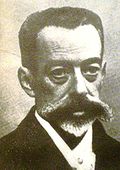
Rafael Obligado
Encyclopedia

Argentina
Argentina , officially the Argentine Republic , is the second largest country in South America by land area, after Brazil. It is constituted as a federation of 23 provinces and an autonomous city, Buenos Aires...
poet
Poet
A poet is a person who writes poetry. A poet's work can be literal, meaning that his work is derived from a specific event, or metaphorical, meaning that his work can take on many meanings and forms. Poets have existed since antiquity, in nearly all languages, and have produced works that vary...
and playwright
Playwright
A playwright, also called a dramatist, is a person who writes plays.The term is not a variant spelling of "playwrite", but something quite distinct: the word wright is an archaic English term for a craftsman or builder...
.
Obligado was the son of María Jacinta Ortiz Urién and Luis Obligado y Saavedra. During the 1880s, he became known as el poeta del Paraná (the poet of Paraná river
Paraná River
The Paraná River is a river in south Central South America, running through Brazil, Paraguay and Argentina for some . It is second in length only to the Amazon River among South American rivers. The name Paraná is an abbreviation of the phrase "para rehe onáva", which comes from the Tupi language...
). He wrote poetry with gaucho
Gaucho
Gaucho is a term commonly used to describe residents of the South American pampas, chacos, or Patagonian grasslands, found principally in parts of Argentina, Uruguay, Southern Chile, and Southern Brazil...
themes, but using cultured and educated language. He was heavily influenced by contemporary French
France
The French Republic , The French Republic , The French Republic , (commonly known as France , is a unitary semi-presidential republic in Western Europe with several overseas territories and islands located on other continents and in the Indian, Pacific, and Atlantic oceans. Metropolitan France...
poetry, and became well-known in Argentina for his poem Santos Vega
Santos Vega
Santos Vega was an Argentine gaucho, and invincible payador , who was only defeated by the Devil himself, disguised as the payador Juan sin Ropa .The myth states he is buried near San Clemente del Tuyú.President Bartolomé Mitre was the first to compose a poem based...
, an ode to a gaucho
Gaucho
Gaucho is a term commonly used to describe residents of the South American pampas, chacos, or Patagonian grasslands, found principally in parts of Argentina, Uruguay, Southern Chile, and Southern Brazil...
-troubadour
Troubadour
A troubadour was a composer and performer of Old Occitan lyric poetry during the High Middle Ages . Since the word "troubadour" is etymologically masculine, a female troubadour is usually called a trobairitz....
, a type of composer and performer known in Argentina under the name of payador.
He married Isabel Gómez Langenheim, and in 1896 commissioned a rural residence with a design based on her preference for the works of Sir Walter Scott
Walter Scott
Sir Walter Scott, 1st Baronet was a Scottish historical novelist, playwright, and poet, popular throughout much of the world during his time....
; the Rafael Obligado Castle
Rafael Obligado Castle
The Rafael Obligado Castle is an architecturally significant private residence located between Ramallo and San Pedro, Buenos Aires Province.-Overview:...
, near Ramallo, Buenos Aires
Ramallo, Buenos Aires
Ramallo is a town in Buenos Aires Province, Argentina. It is the head town of the Ramallo Partido. It is located on next to the Río Paraná.-Economy:...
, is one of the premier estancia
Estância
Estância is a municipality located in the Brazilian state of Sergipe. Its population was 62,218 and its area is 642 km². The city is the seat of the Roman Catholic Diocese of Estância....
s in the Pampa
Pampa
The Pampas are the fertile South American lowlands, covering more than , that include the Argentine provinces of Buenos Aires, La Pampa, Santa Fe, Entre Ríos and Córdoba, most of Uruguay, and the southernmost Brazilian State, Rio Grande do Sul...
s region.
Obligado was one of the founders of the Department of Philosophy and Literature of the University of Buenos Aires
University of Buenos Aires
The University of Buenos Aires is the largest university in Argentina and the largest university by enrollment in Latin America. Founded on August 12, 1821 in the city of Buenos Aires, it consists of 13 faculties, 6 hospitals, 10 museums and is linked to 4 high schools: Colegio Nacional de Buenos...
, where he served as the Assistant Dean on several occasions; in 1909 he was awarded an honorary doctorate by the university.
He died in Mendoza, Argentina
Mendoza, Argentina
Mendoza is the capital city of Mendoza Province, in Argentina. It is located in the northern-central part of the province, in a region of foothills and high plains, on the eastern side of the Andes. As of the , Mendoza's population was 110,993...
, in 1920.

